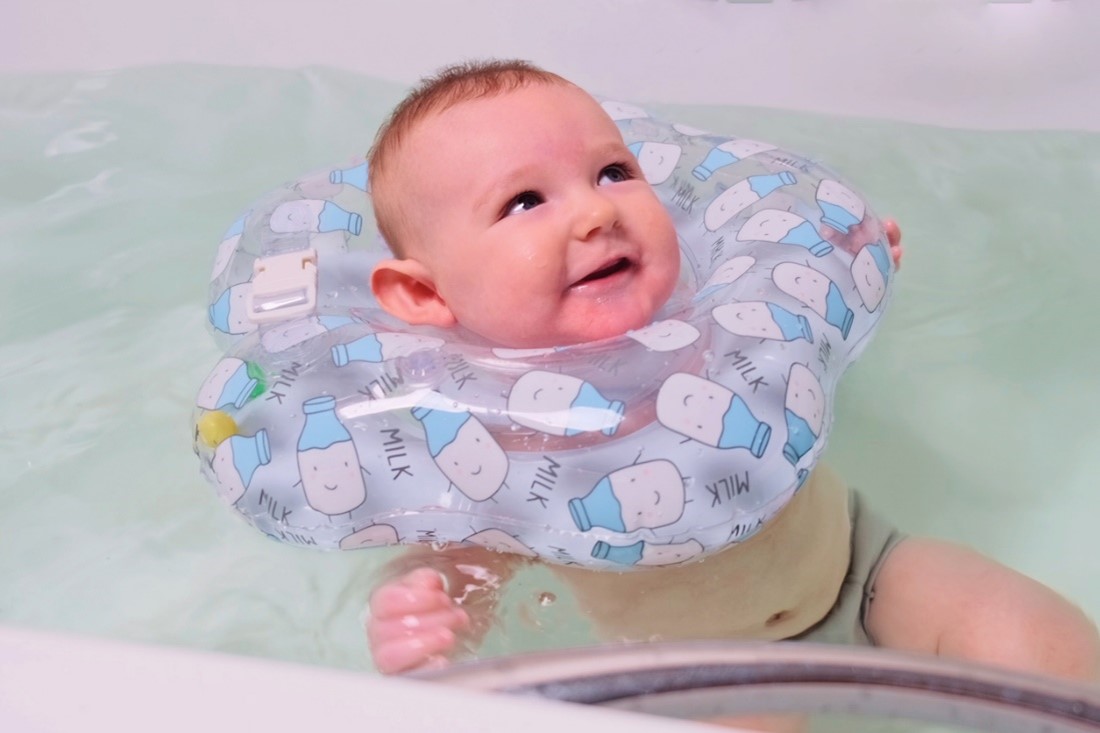Summer is officially here! For many of us, that means days spent hanging out at the pool or beach with our kids.
And while it’s all fun and games, water safety is definitely an ongoing concern.
Many parents turn to flotation devices such as life jackets, swim belts, and water wings to keep their children safe.
However, not all devices are the same. And one, in particular, is being cited as a safety hazard.
The U.S. Food and Drug Administration (FDA) is warning parents and caregivers not to use baby neck floats after the death of at least one infant and the hospitalization of another.
The FDA noted that both incidents occurred while the babies were not being directly supervised. The agency also admits that there could be additional cases that have gone unreported.
The FDA specifically cautions against the use of the rings for water therapy interventions, particularly for babies with developmental delays or special needs.
According to the agency:
“The risks of using baby neck floats include death due to drowning and suffocation, strain, and injury to a baby’s neck.
Babies with special needs such as spina bifida or SMA Type 1 may be at an increased risk for serious injury.”
Babies wear the inflatable plastic rings around their necks. The rings are designed to cradle a baby’s head while allowing their body to move freely in the water.
They are used for swimming and at bath time.

According to the FDA, the flotation devices are marketed for “infants as young as two weeks old as well as premature babies or those with developmental delays or disabilities.”
Recently, the agency also became aware of the fact that manufacturers are marketing neck floaties for use as a water therapy tool. However, they do NOT have FDA clearance or approval to do so.
The companies advertise that the benefits of these products include: “increased muscle tone, greater flexibility and range of motion, increased lung capacity, better sleep quality, and increased brain and nervous system stimulation.”
This is yet to be proven.
The FDA writes:
“The safety and effectiveness of neck floats to build strength, to promote motor development or as a physical therapy tool, have not been established”
As for the use of neck floats as a water safety device?
Pediatricians and experts say no.
Kyran Quinlan, Associate Professor of Pediatrics at Rush University Medical Center and former chair of the American Academy of Pediatrics (AAP) Council on Injury, Violence and Poison Prevention told Good Housekeeping:
“Neck floats for babies scare me to death, and I hope they scare parents. These are potential death traps … To have your precious baby one poorly sealed seam away from going under at the pool is frightening.”
Dr. Sarah Denny, a pediatrician and spokesperson for the American Academy of Pediatrics, agrees.
In an interview with ABC News, she said:
“There is no data to support these neck floaties. So I think that is the most important piece for parents to know.
The other thing is, is when it comes to water safety, nothing inflatable is considered a water safety tool.”
Inflatables provide parents (and children) with a false sense of security.
They believe that using them will prevent drownings but the potential for failure exists. This is due to the fact that the inflatable material can puncture, deflate, or loosen.
As for what Denny and the AAP do recommend for infants and children? A U.S. Coast Guard-approved life jacket.
The AAP also recommends the following water safety tips to prevent drownings:
- Parents and caregivers should never leave children alone or in the care of another child while in or near bathtubs, pools, spas, or other open water.
- Adults should empty water from buckets and other containers immediately after use.
- Do not leave young children alone in the bathroom. Toilet locks can prevent drowning of toddlers.
- When infants or toddlers are in or around the water, a supervising adult with swimming skills should be within an arm’s length, providing constant “touch supervision.”
Swimming lessons are also a must.
While the FDA believes that death or serious injury from neck floats is rare, it is important to be aware of the potentially lethal risks associated with these products.
And to do your due diligence if you chose to use them.
If you do use baby neck floats and experience adverse events associated with them, the FDA encourages you to file a voluntary report through MedWatch, the FDA Safety Information and Adverse Event Reporting program.
You can read more about the FDA neck float warning here.











